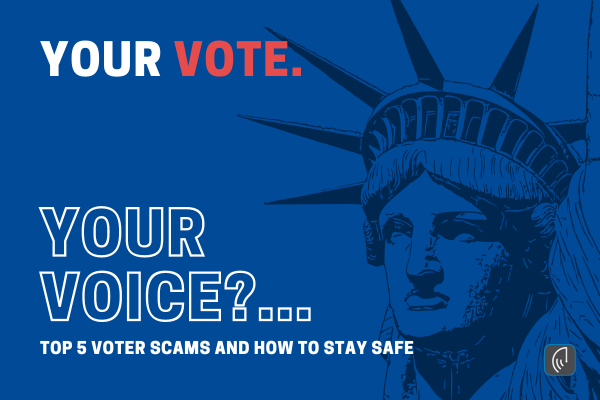Election season often brings about a surge in election-related scams, as scammers exploit the voting process to deceive unsuspecting citizens. From fraudulent donation requests to fake voter registration, it’s crucial to be vigilant. By staying informed, you can avoid becoming a victim of these voter scams and protect your personal information. Here’s a breakdown of the most common election-related scams and how to safeguard your identity and vote.
1. Fraudulent Voter Surveys and Polls
During election season, voters are often asked to participate in political surveys. Unfortunately, scammers use this by posing as legitimate polling organizations to trick people into sharing personal details. These voter scams may even promise cash rewards, only to request unnecessary information such as credit card details or Social Security numbers.
How to Protect Yourself:
- Limit information shared. Stick to basic, non-sensitive information like age or general voting preferences. Legitimate polls will never ask for your financial or personal information.
- Be cautious of rewards. Genuine political surveys will not offer incentives.
- Verify the source. Always ensure the polling organization is credible by searching for reviews or contacting them directly.
Avoid these election-related scams by verifying any survey before participation. For more information, visit FTC.gov.
2. Fake Voter Registration Offers
One of the most common election-related scams involves fraudsters offering fake voter registration services. These scammers use phone calls, emails, or text messages to direct you to illegitimate websites, where they steal your personal data.
How to Protect Yourself:
- Use official sources. Only register to vote through your state’s official election website or a trusted resource like CanIVote.org.
- Avoid unsolicited offers. Scammers often initiate contact under the guise of voter assistance, so be skeptical of unsolicited requests for your personal information.
- Check your registration status. Always check your voter registration directly through official election resources, such as USA.gov.
By being cautious of fake voter registration offers, you can prevent your personal information from being compromised.
3. Political Donation Scams
Political donation fraud is a significant threat during election season. Scammers pretend to be affiliated with political campaigns, asking for donations. These election-related scams often involve phishing emails or calls where you’re directed to a fake website to “donate.”
How to Protect Yourself:
- Donate directly. Always donate to political campaigns through verified official websites.
- Research organizations. Platforms like Charity Navigator can help verify legitimate organizations.
- Avoid third-party links. Be cautious of links sent through emails or social media, as they may lead to fraudulent sites.
Stay safe by ensuring your donations are secure and avoiding political donation scams.
4. Impersonation Calls for Campaign Contributions
One of the riskiest election-related scams involves scammers using caller ID spoofing to impersonate a political candidate or campaign. These calls often ask for immediate campaign contributions and are difficult to spot because they may appear legitimate.
How to Protect Yourself:
- Avoid robocalls. Legitimate campaigns may use pre-recorded messages, but they won’t ask for sensitive financial information over the phone.
- Donate through official channels. Visit the candidate’s official website or trusted fundraising platforms to donate securely.
- Be skeptical of caller ID. Caller ID spoofing is common, so don’t trust the number displayed without verifying it.
5. Suspicious Political Petitions
Fraudulent petitions are another tactic used in election-related scams. Scammers use petitions as a way to collect personal information, such as Social Security numbers or other sensitive data, under the guise of supporting a cause.
How to Protect Yourself:
- Use trusted platforms. Sign petitions only from reputable organizations or well-known platforms like Change.org.
- Limit personal information. Legitimate petitions do not ask for sensitive personal information, such as your Social Security number or financial details.
- Verify the cause. Research the petition to ensure it’s legitimate before providing any information.
Additional Resources for Reporting Election-Related Scams
If you suspect that you’ve encountered an election-related scam, you should report it to the appropriate authorities. Here are some helpful resources:
- Federal Trade Commission (FTC): File complaints and stay updated on scams at FTC.gov.
- Better Business Bureau (BBB): Report fraud and learn about ongoing scams at BBB.org.
- National Association of State Election Directors (NASED): For information on ensuring your vote is secure, visit NASED.org.
Conclusion: Protect Yourself from Election-Related Scams
As election season approaches, it’s crucial to be vigilant and informed about election-related scams. Scammers use various tactics, from voter scams to political donation fraud, to trick people into revealing sensitive information. By sticking to official channels for voter registration, donations, and petitions, and by verifying the legitimacy of any request, you can protect yourself and your vote.
Stay cautious and always verify before sharing personal details or money during election season.
FAQs
1. What should I do if I receive a suspicious voter registration request?
If you receive an unsolicited voter registration offer, do not provide any personal information. Instead, visit CanIVote.org to verify your registration.
2. How do I know if a political donation request is legitimate?
To avoid political donation fraud, always donate through the candidate’s official website or a secure, verified platform. Never respond to unsolicited emails or phone calls asking for money.
3. Can I trust petitions that ask for personal information?
Legitimate petitions do not ask for sensitive personal data, such as Social Security numbers or financial information. Stick to trusted platforms and always research the organization before signing.
4. Are election surveys supposed to ask for my Social Security number?
No, legitimate election surveys will never ask for your Social Security number or other sensitive personal information. If asked, it’s likely part of an election-related scam.
5. Where can I report an election-related scam?
You can report election-related scams to the Federal Trade Commission (FTC) at FTC.gov or the Better Business Bureau (BBB) at BBB.org.
Articles related to election-related scams:
- How to Protect Your Data from Data Brokers: A Complete Guide
- Is the NPD Breach NBD? How Your SSN Is at Risk From This and Other Major Breaches
- www.defend-id.com
